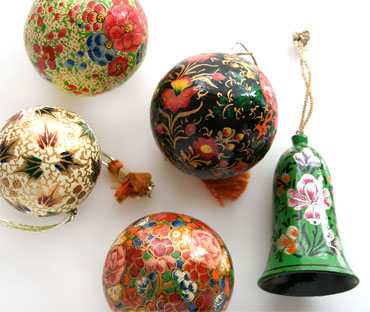Diaspora Hinduism and the December Dilemma
By Deepak Sharma | Дек 21, 2011

There is no period in the Gregorian calendar more demanding and transformative for diaspora Hindus than the weeks leading up to and culminating with Christmas. In daycares and schools, in workplaces and civic spaces, on television and in the digital media in North America, Hindus are constantly reminded about the holy days of Christians. Self-reflection is inevitable and inescapable when one is frequently enjoined to “Have a Merry Christmas” or even to “Enjoy the Holidays” when one sees no reason to celebrate the birth of Christ or when the days ahead are not considered holy.
With all of the marketing of merriment and conspicuous consumption, it is hard for diaspora Hindus not to feel left out, lacking, or deprived. This is especially true for the children of immigrants who are painfully aware of gift exchanges in schools and classrooms before Christmas and the plethora of presents that Christian classmates have received (made aware either after Christmas vacation is over or by observing the curbside evidence the day after Christmas). Christian classmates are stupefied that their “poor” and “downtrodden” Hindu friends have not received any gifts (confirming unfortunate stereotypes about poverty in India), and (seemingly delinquent) Hindu parents are forced to answer accusations of injustice and child abuse from their confused children.
Hindus have responded to the challenges of living in a Christian-centric society in many ways, though I will examine only two here.
Ho Ho Ho!: hota hai (you have to do it)
Many Hindus celebrate Christmas. Inundated by Christmas cheer and pressured by their children, Christmas has become part of the lives of diaspora Hindus.
Some have decided to celebrate Christmas superficially, as a mere commercial holiday. They purchase Christmas trees, gifts for one another, and encourage their children to enjoy the Santa Claus myth, in the same way that they may encourage their children to enjoy (and benefit from) the tooth-fairy myth. They classify Christmas as a secular, commercial, festival for children, in the same way that Father’s Day, for example, is a festival for fathers.
Others utilize Hindu, specifically Vaishnava, theology to reconfigure Christmas to be a Hindu tradition. Vaishnavas believe that Vishnu has avataras (incarnations). These avataras of Vishnu appear and act in the world in order to defend dharma and his devotees. They characterize Christ to be an avatara of Vishnu. By including Christ as just another avatara of Vishnu, they indirectly make Christianity just another sect of Hinduism.
It is not surprising that the retail world has reacted to these markets in North America by making available Hindu ornaments that can be used on Christmas trees. Though the intended market is likely non-Indian, new age, yoga practitioners, it overlaps with diaspora Hindu families. The Christmas tree, a popular symbol of Christmas in North America is re-appropriated by Hindus and spiced with Hindu flavors.
No matter what narrative is given about the relevance of Christmas, secular, Vaishnava etc., many Hindu parents believe that they have to accept and celebrate it given the pressures of their immediate surroundings and shame that they will likely feel if they do not permit their children to have fun in these prescribed ways. Christmas celebration has become another dharmic obligation.
Read more: http://www.huffingtonpost.com/deepak-sarma/diaspora-hinduism-december-dilemma_b_1146343.html















